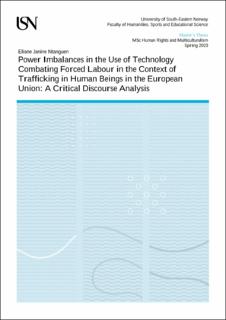Power Imbalances in the Use of Technology Combating Forced Labour in the Context of Trafficking in Human Beings in the European Union: A Critical Discourse Analysis
Master thesis
Permanent lenke
https://hdl.handle.net/11250/3074809Utgivelsesdato
2023Metadata
Vis full innførselSamlinger
Sammendrag
Technology has been used by the European Union in combating forced labour in the context of human trafficking over the last decade. However, the Covid-19 pandemic has given a strong impetus to the discourse on the use of technology to combat this crime. Forced labour in the context of human trafficking has become a crime facilitated by the internet and technology. Law enforcement agencies are, therefore, increasingly using technology to identify victims, perpetrators and suspicious job advertisements on job portals.
This thesis focuses, therefore, on the power imbalances in the use of technology combating forced labour in the context of trafficking in human beings in the European Union. The sample comprises documents published by the European Commission, its agency Europol, the Organisation for Security and Co-operation for Europe and the Council of Europe. The data is analysed using a Critical Discourse Analysis inspired by Fairclough to reveal power relations in the discourse. This thesis finds that the European Commission uses its power to decide that technology should be used to identify victims but not to empower them. Instead, the argument of protecting victims is used to justify technology-based border control. In addition to border security, the European Commission also targets cybersecurity and calls for stronger legal frameworks to facilitate the work of law enforcement agencies. The European Commission calls for training in working with technology, as well as increased cooperation between European and non-European law enforcement agencies and the private sector. It is argued that the European Commission willingly accepts responsibility if it means more power (as in the case of stronger legal regulations). However, the European Commission uses cooperation to shift responsibility to the private sector. Overall, it is shown that the goal of the European Commission is the security state and that its argumentation discriminates against victims of forced labour in the context of trafficking in human beings and excludes their needs from the discourse. The European Commission uses opacity to maintain hegemonic power relations.
